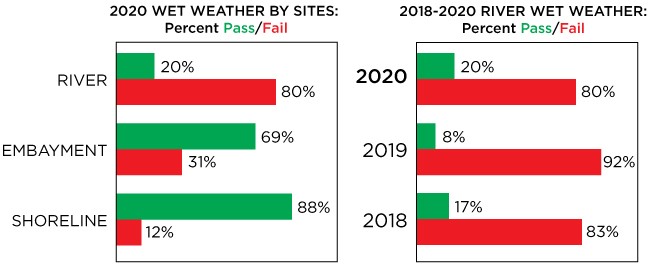
For Immediate Release: November 24, 2020
Contacts: Laura McMillan, Save the Sound lmcmillan@savethesound.org
Collaborative discussions yield proposed consent decree with clean water and public health benefits
Rye Brook, New York – Save the Sound, Atlantic Clam Farms of CT, and the Village of Rye Brook have reached a settlement that will reduce water pollution and help ensure local residents can enjoy a clean and healthy Long Island Sound. The agreement is memorialized in a proposed consent decree that has been filed jointly in the Federal Court for the Southern District of New York. Under the Clean Water Act, the Department of Justice has 45 days to review the settlement and provide any comments, after which the judge may enter the consent decree.
In 2015, Save the Sound filed a lawsuit for violations of the Clean Water Act against Westchester County and the following Sound shore municipalities: Harrison, Larchmont, Town of Mamaroneck, Village of Mamaroneck, New Rochelle, Pelham Manor, Port Chester, City of Rye, Rye Brook, Scarsdale, and White Plains. The lawsuit addresses the widespread state of disrepair of the underground sewer pipes and other parts of the sewer collection systems in these municipalities. In these communities, over 15,000 gallons of raw sewage and over 26.5 million gallons of partially treated sewage were discharged from under-maintained pipes in a four-year period.
In addition to Rye Brook, Save the Sound has now entered into settlements for consent decrees with Village of Mamaroneck, Port Chester, and White Plains to repair their systems. In the other towns—Harrison, New Rochelle, Pelham Manor, Town of Mamaroneck, Larchmont, Rye, and Scarsdale—repairs have been negotiated and ongoing since the suit was filed but no final settlements have been reached. In total, as a result of the lawsuit, 530.5 miles of pipe have been designated to be studied and repaired, and 38,604 defects have been found. In 2017, New York State committed to providing $2.5 billion for multi-year grant funding to communities to address these exact types of water infrastructure needs. Several communities in the suit have already received such grants to meet their obligations to maintain and upgrade their infrastructure.
Since Save the Sound filed the suit in 2015, Rye Brook has been actively engaged in discussions and working on repairing its sewer system, having completed many pipe lining and manhole repairs. In addition, the Village completed a Sanitary Sewer Evaluation Study (SSES) in September 2017, a Work Plan based on the SSES in March 2019, and a Supplemental Work Plan in May 2019. The Village of Rye Brook has also kept everyone well informed by providing an Information Update in July 2019 and an additional Information and Clarification Update in October 2019.
“We commend the Village of Rye Brook for pro-actively entering into discussions and commencing work soon after our lawsuit was filed,” said Roger Reynolds, senior legal counsel for Save the Sound. “As a result, much of the work is already completed and the remainder of it will be completed shortly. We are confident that the repairs to the sewer system and the bio-retention project being implemented will pay huge dividends for clean water and a healthy community in Rye Brook.”
The parties agreed to file a proposed consent decree in Federal Court for the Southern District of New York under the authority of the Clean Water Act, in which the Village of Rye Brook would agree to:
- By April 1, 2021, complete all remedial measures that should put it into compliance with the requirements of the County Sewer Act;
- By September 30, 2021, draft and implement operational measures that will keep the system in good working order and prevent violations and spills going forward;
- Perform flow monitoring in 2021 to verify compliance with the Westchester County Sewer Act;
- Complete an environmental benefit project to install bio-retention filtration system at the Village Hall and Firehouse which will remove pollutants such as total suspended solids (TSS), phosphorus, nitrogen, metals, and oil and grease from parking lot runoff; and
- Contribute to Save the Sound’s attorneys’ fees and engineering expert costs related to the suit.
Beginning by February 2021, all information regarding the Village of Rye Brook’s maintenance and repair plan, as well as its operational and management plans, will be published on its website, and will be updated periodically as the work continues.
Save the Sound’s annual water quality monitoring shows that fecal bacteria levels continue to be unacceptably high in area rivers, illustrating the need for corrective action. This year, monitoring conducted in Westchester County and surrounding areas revealed an alarming 80% failure rate of river samples collected during wet weather. Stormwater often carries fecal contamination and other pollutants into the nearest river or stream. Overloaded, collapsed, or blocked sewer lines will surcharge during rain, leaking untreated sewage into the stormwater system which drains to rivers and streams.

Click here to view interactive map and access the data sets
As part of Save the Sound’s Sewage Free Long Island Sound program, the organization has also reached agreements to address sewage infrastructure failures in Connecticut with the Town of Darien and the City of Danbury and is in talks with several more towns and cities.
Save the Sound and Atlantic Clam Farms of CT are represented in this matter by Super Law Group.
